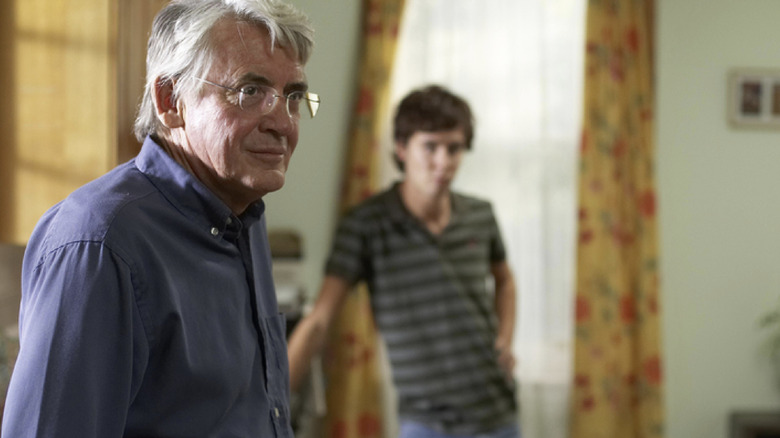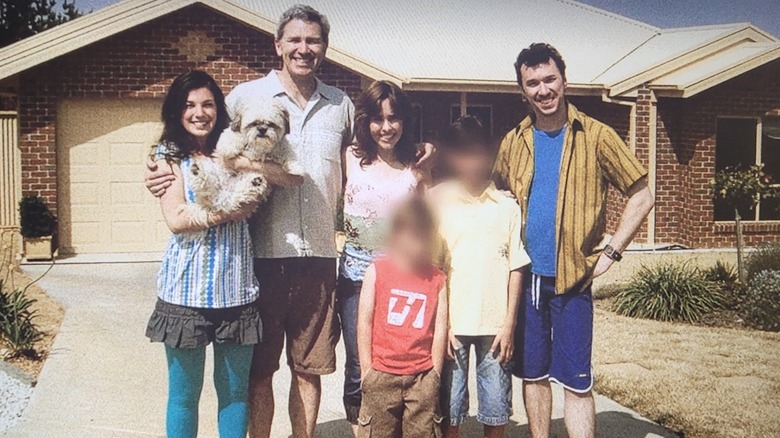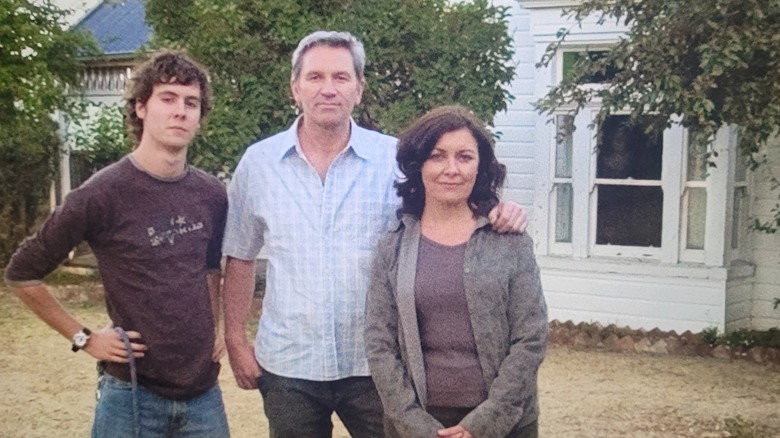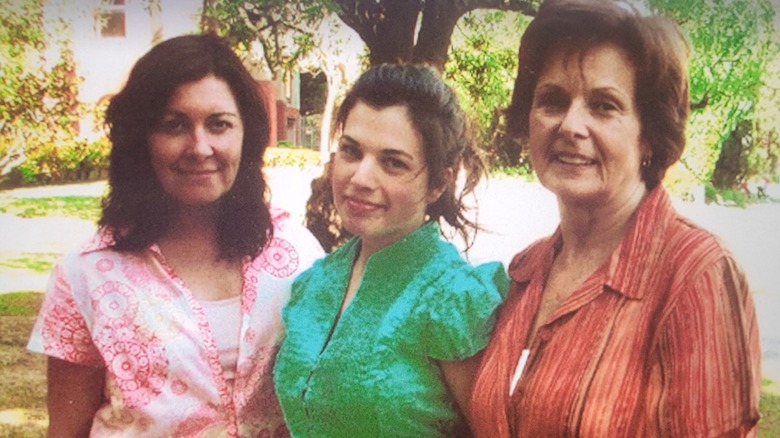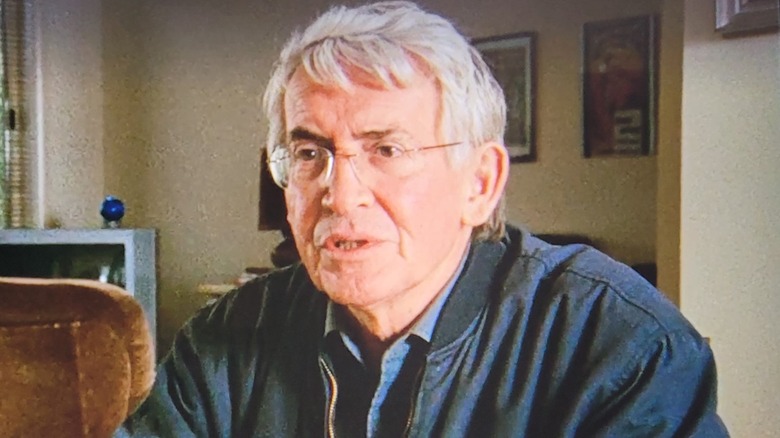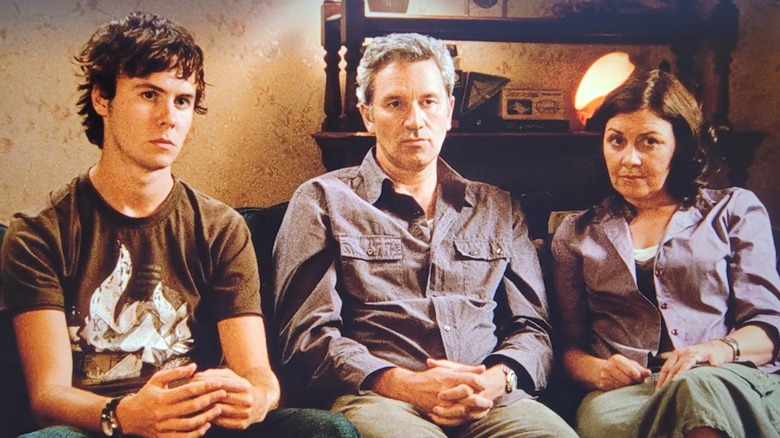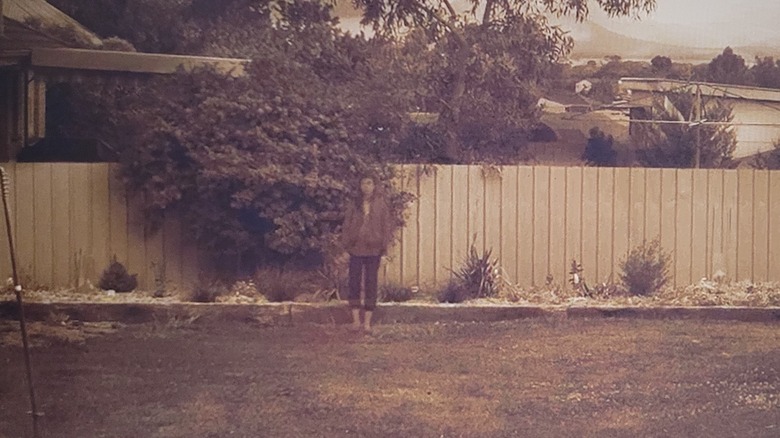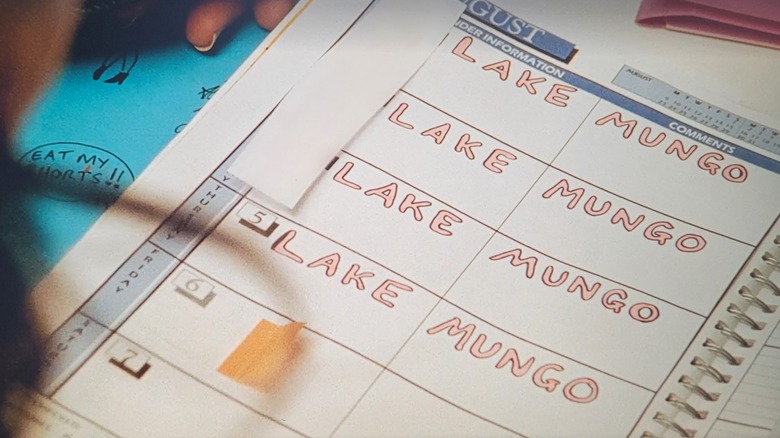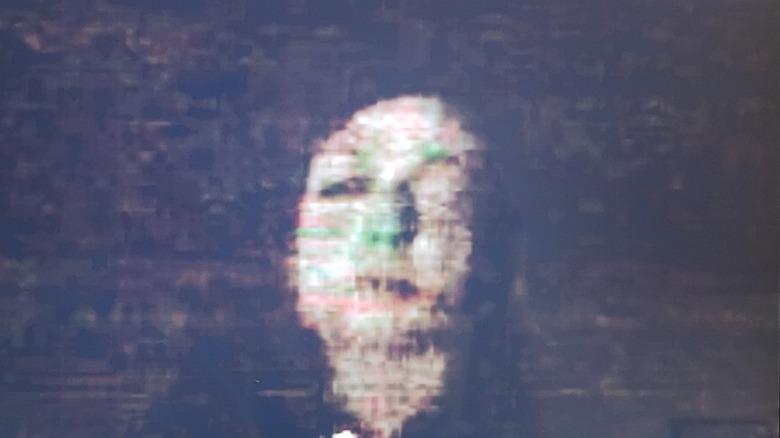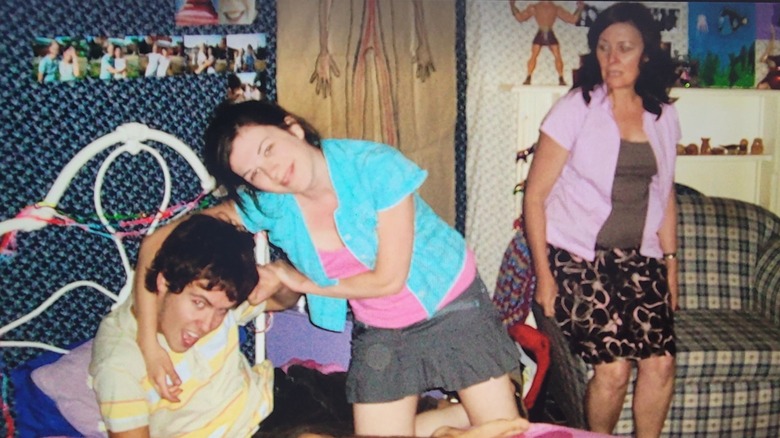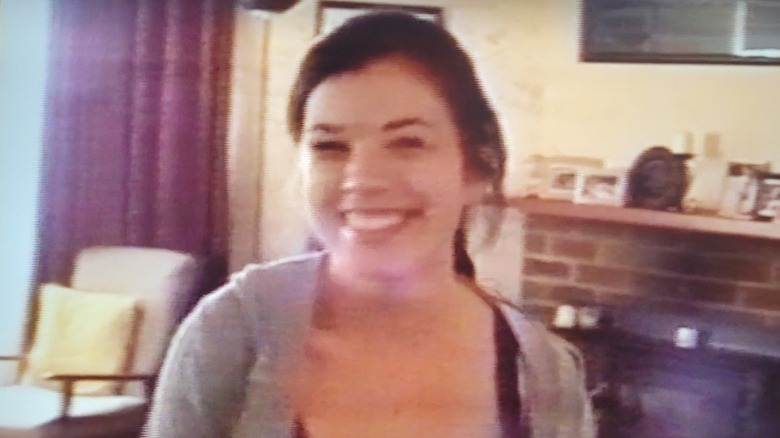The Ending Of Lake Mungo Explained
While some horror films use over-the-top gore to terrify audiences (even being banned for being too disturbing), others rely on more subtle tactics to give viewers a chill. A prime example of the latter is 2008's "Lake Mungo," directed and written by Joel Anderson.
The Palmer family, comprised of dad Russell (David Pledger), mom June (Rosie Traynor), son Mathew (Martin Sharpe) and daughter Alice (Talia Zucker), are enjoying a day by the water when the unthinkable happens: Alice goes missing while swimming and is later found deceased, barely recognizable from the time spent submerged. Over the course of this 90-minute mockumentary, each of the living Palmers grieves the death of Alice in their own way. All the while, there's the ongoing question of whether or not Alice's spirit is haunting their home.
Eventually, after visiting Lake Mungo (the place where Alice's downward trajectory begins on a school camping trip) the family finally feels a sense of closure and calm. However, the same can't be said for Alice at the end of the film. As her parents and brother pack up and leave, ready to start fresh in a new house, Alice's ghost can be seen watching from the window.
Alice lived a secret, troubled life prior to her death
At the beginning of "Lake Mungo," a recording is played of Alice, who describes feeling a sense of dread and that something terrible is about to happen. It turns out that she's correct, with the drowning occurring not long after. "Lake Mungo" depicts the emotional rollercoaster felt by Alice's loved ones — particularly June, who at one point has doubts that the girl Russell identified to police is actually Alice.
Making matters worse, when Mathew gets into photography, he shows his parents eerie images of Alice standing in the backyard and around the house. Psychic consultant Ray Kemeny (Steve Jodrell) is even called in to try and connect to her spirit. Though it's revealed that Mathew doctored the images to give his parents some hope, this isn't the end of the family's troubles.
While on a trip with Ray, Mathew keeps his cameras rolling in the house (just in case), and captures next door neighbor Brett Toohey (Scott Terrill) lurking near Alice's room. Freaked out by her death, Brett is trying to retrieve a videotape of himself and his wife Marissa (Tamara Donnellan) being intimate with Alice, their children's babysitter. Basically, they don't want to look guilty for her death if the tape is discovered.
Similar to her mother and grandmother Iris Long (Judith Roberts), Alice likes her privacy and keeps secrets. Therefore, no one even suspects her situation with the Tooheys until after her death, when June finds the tape.
Alice's spirit is present in the Palmer home
Toward the end of the film, the Palmers discover footage from Alice's time at Lake Mungo during a school camping trip, not long before her death. She is seen burying her cell phone and other prized items that she told her parents she lost, once again tapping into her secretive nature. The footage also includes what likely begins Alice's feeling of dread, which she describes to Ray in the recording heard at the beginning of the film. She's greeted by the horrifying presence of her future drowned self, who has the same deformed face that Russell has to identify for police.
After visiting Lake Mungo themselves in an attempt to find more answers, the Palmers finally feel a sense of calm at home. In their opinion, they've learned all of Alice's secrets and understand who she truly was, which, deep down, she craved all along. They go on with life, celebrating birthdays and making the decision to move somewhere with less dark memories.
All seems well ... until the birthday party, moving day and other happy occasions are shown to audiences again. Unbeknownst to Russell, June and Mathew, Alice's spirit is present, watching them from a distance. She's there as the candles are blown out and, as the trio stands in front of the house, smiling and ready for life's next chapter, is seen standing forlornly in the window.
Alice is alone in life and death
Throughout the entirety of "Lake Mungo," the Palmers and viewers alike are left guessing about whether or not Alice's spirit is haunting the home. Yes, Mathew fakes some of those photos, but that doesn't explain June sensing a soaking wet Alice standing at the foot of her bed, nor the mysterious sounds coming from Alice's bedroom.
She was there all along and still is, but now that her family has moved past their grief, they're done looking for signs of her presence. In life, Alice silently navigates the trauma of the Tooheys and never feeling fully seen by June (just as June feels about Iris). In death, she's still very much silently struggling to make her family see her. Though the viewer can clearly spot Alice — and is probably yelling, "Turn around!," to the Palmers through the screen — they're oblivious to her.
Ultimately, "Lake Mungo" has a pretty sad ending. When she's alive, Alice's family assumes she is completely fine. Yet they, as well as her friends, only see one of many sides to her. Little do they know the darkness she's battling. Now, they believe she's at peace in death, but that's far from the case. Alice is still troubled, alone and isolated from her loved ones.
Alice and June had the same visions from different perspectives
In "Lake Mungo," there's an unexplainable connection across time and space, mainly between Alice and June. Both visit Ray Kemeny separately — Alice prior to her death and June after her daughter's demise — and share details of the same vision, just from different perspectives.
June tells Ray that she sees Alice, soaked from the water in which she drowned, standing at the foot of her bed. It's so terrifying that, for several nights, June walks the streets instead of going to sleep. In a second conversation, she recalls walking into Alice's room, only to find that she's not there. Noticing that it's empty, June leaves.
As for Alice, she describes watching June from the foot of the bed. She also sees her mom walk into the bedroom, look around and leave without acknowledging her, which feels extremely hurtful for Alice. Little does she know, she's seeing this all unfold from the perspective of her future dead self, an ability seemingly unlocked following her strange encounter at Lake Mungo.
Director Joel Anderson describes Lake Mungo as an exploration of grief
"Lake Mungo" might be described online as a horror/thriller, but according to director and writer Joel Anderson, that's not quite accurate. In a 2009 interview with After Dark Films, he said, "I think it's meant to be an exploration of grief. That's why we shot it like a documentary, so we could look at different characters and how they responded to a situation."
Specifically, added Anderson, "Lake Mungo" explores how individuals cope with one of humanity's greatest fears: the unexpected death of a loved one in a tragic accident. As seen with the Palmers, it's natural to try and make sense of what happened, all while struggling to fully accept that the person is truly gone.
"I think the potential — the idea that they might still exist, in a paranormal sense, that there might be something of them left behind — is incredibly strong and people have a very strong affinity with that idea because it gives hope; it's a strange kind of hope, but it's better than nothing," said Anderson.
Technology affects our sense of reality
In "Lake Mungo," technology plays a massive role, something intentionally engineered by Anderson. For the Palmers and viewers alike, determining what's real and not real is largely done through photographs, home movies, cell phone videos and audio recordings.
In an interview with After Dark Films, he said, "[I]n a way, those images of Alice that come, the images in photograph and video that there's no rational explanation for, they are like the last home movies of her. So, in lots of ways, I'm really interested in how our sense of what is real, our sense of how we remember things, is videoed through technology — nowadays, more so phones, video phones."
Unbelievable phenomena, such as Alice's encounter with drowned Alice at Lake Mungo that's captured on her phone, are made believable thanks to technology, thus moving the film in a direction that it couldn't have gone otherwise. After viewing the horrifying cellphone footage, Mathew says, "I believe she recorded a ghost. I believe she recorded the future coming to get her." Without such footage, the Palmers would have no idea what caused Alice to feel such dread during her final weeks.
Additionally, "Lake Mungo" was created using an array of technological formats, including 16mm and 35mm films, which, said Anderson, made it seem less mockumentary-esque.
Did Alice's visit to Lake Mungo seal her tragic fate?
The ending of "Lake Mungo" makes sense: Alice is haunting the house and she's not at rest. One question, however, remains unanswered: If she hadn't gone to Lake Mungo on that school camping trip, would the same events have unfolded?
Before the trip, Alice was already living a troubled life due to the Tooheys and her tendency to shut herself off from people. But at that point, there seemed to be no sense of impending doom or death. That all begins at Lake Mungo, when she comes face-to-face with her future dead self and buries her possessions in a sort of ritual.
Lake Mungo, a real place located in New South Wales that's home to some of Australia's oldest human remains, might also be home to something sinister (in the movie, at least) that feeds off of Alice's turmoil and presents her with that vision, setting in stone her tragic fate and opening that connection between time and space. If she never went to Lake Mungo, it's possible the same vision could've come after her at home or school, though it seems unlikely.
It's unclear what caused Alice to drown
There's also a lingering question of how, exactly, Alice died. Yes, she drowned, but what causes her drowning? The way Mathew describes their time in the water, they were having an enjoyable day and he decided to head back to shore. He doesn't mention rough water or anything of the sort, just that Alice informed him she'd be staying in a little longer.
Alice meeting her demise because of the water itself can be ruled out, as there are too many strange aspects surrounding the situation for it to be a freak accident. This leaves two options: either she caused her own death (too tired of living in shame and fear due to the Tooheys and her Lake Mungo encounter), or something sinister met her in the water after Mathew swam away.
Regarding the former possibility, Alice may have wanted to wait until she was alone, her family distracted on shore, before taking her own life. In an effort to not cause them more pain than necessary, she'd meet her untimely end in the water, where her death might pass for an accident. As for the second possibility, Alice's summer camp trip seems to have set her fate in motion, which means drowned Alice may have been waiting below, ready to pull the alive one down and bring everything full circle.
Some hail Lake Mungo as unsettling
"Lake Mungo" never received a sequel, despite Alice's ghostly presence in the house perhaps setting one up. Still, it resonated; though the film barely received a theatrical release, it has an impressive 96 percent approval rating on RottenTomatoes, and still generates discussion more than a decade later.
On Reddit, a user named u/hotpotfunkmeister said of the ending, "This. Is. Horrifying. Like her torment isn't over. I know it's cliched. Oh another restless spirit haunting a place ... But this isn't some Victorian era ghost haunting the hallways. It's a 15 year old teenager with a mobile phone, who would otherwise be hanging out at malls etc. Like I can't imagine how scared she must be. Like something bad had happened, she doesn't know what, and where is everyone? Mom? Mom?!"
This comment begs another question: Alice knows something bad is coming, but is she aware of when it actually does? She describes feeling hurt that June doesn't acknowledge her when walking in the bedroom. It's possible that, in death, she thinks she's still alive. This could explain why she's at the birthday party (why wouldn't she be?) and looking out the window as her family moves (why are they leaving her behind?).
Another Reddit denizen named U/horrorworthwatching found "Lake Mungo" disturbing because it focuses on the finality of life that everyone experiences. A third Redditor by the moniker u/pixelated_pixie found Alice's anxiety and depression to be very relatable: "The fear that you are not being seen because even after the credits roll that twist, just gutted me."
Lake Mungo was originally supposed to be a larger project
When Joel Anderson first set out to create "Lake Mungo," he intended for it to be a large-scale production. However, when he struggled to obtain the needed finances to make such a project happen, he went back to the drawing board and crafted something that would be simple and affordable, yet effectively haunting.
The low budget of "Lake Mungo" didn't allow the actors to have much rehearsal time. In fact, according to Anderson, this limited time gave the cast freedom to improvise. "[T]hey were often very analytical in the way they were thinking about their character and how their character would respond given the circumstances," he told After Dark Films. "That was very, very exciting. I think it creates something you can't actually get in scripted work."
Even though the final result of "Lake Mungo" isn't what Anderson envisioned when he set out to create this story of grief, it may have been for the best. The simplicity of the fuzzy cell phone footage, emotional interviews and double take-inducing photographs all come together to create a disturbing, unnerving experience, which is the goal of any great horror.
